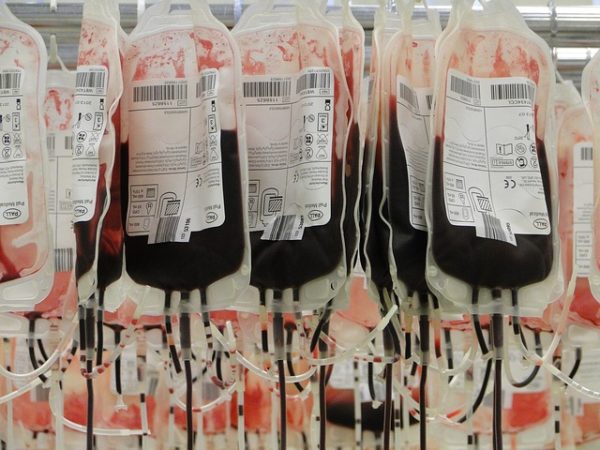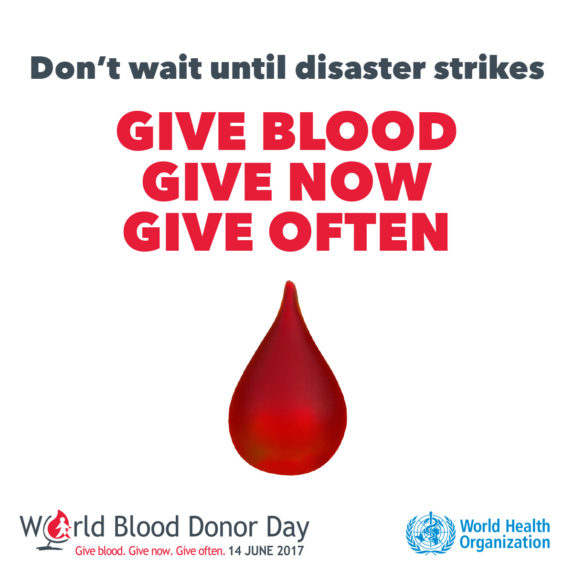
sabinurce / Pixabay
Did you know this about donating blood?
About 38 percent of the population can donate; less than 10 percent of those eligible do.
Today is World Blood Donor Day. The annual event is organized by the World Health Organization (WHO) to remind us all to not only think about becoming a blood donor but to actually take the necessary steps.
It’s not that difficult. You can donate at a blood drive or a donation center. Of course, it’s critically important that donated blood is safe and it’s critically important that it’s safe for a person to be a donor. That’s why all potential donors are evaluated to make sure they’re eligible. You can look at the criteria to become a donor on the American Red Cross website.
The focus of this year’s World Blood Donor Day is the need for blood in an emergency. The first thought many people have when they hear of a disaster or an emergency situation is “What can I do to help?”
Here’s one thing you could do.
When I was researching blood donations, I discovered that here in the United States, summer was an especially important time to donate. Mary Brant, external communications manager, Northern New England Blood Services Region explained why.
Why are new and current blood and platelet donors needed in the summer months?
While the need for blood remains constant throughout the summer, the Red Cross experiences a drastic decline in new donors, and current donors often delay giving due to summer vacation plans. Those who have never given blood before and current donors are needed to donate blood or platelets this summer to help sustain a sufficient community blood supply.
How does a decline in donations from new and current donors contribute to blood shortages?
A reduced number of new and current donors during the summer contributes to an overall decline in blood and platelet donations that makes it difficult to keep pace with hospital patient needs. Last summer, nearly one-third fewer new blood donors came out to give than during the rest of the year.
Many schools where blood drives are held – and where new donors give – are not in session this time of year. Additionally, a recent Red Cross survey showed that about 73 percent of blood and platelet donors had vacation plans this summer, which could impact their availability to donate.
Bonus question: When there is a major emergency – like the Boston Marathon Bombing – where is the best place to go to donate blood quickly?
In an emergency, it’s the blood already on the shelves that saves lives. Although all donations are greatly appreciated, every blood donation is required to go through a rigorous testing regimen to keep our blood supply safe and would not be available for distribution to hospitals immediately. The best way to help in an emergency is to become a regular donor – blood can be donated safely every 8 weeks – and treat that appointment as one your most important!
6 great tips for a successful blood donation.
When you donate blood, it usually takes about an hour — that includes filling out a form in the beginning and hanging around after you donate to sip some juice and eat some snacks. The actual donation only takes about 10 minutes.
“In less time than it can take to go out to eat, you can make a lifesaving difference for cancer patients, accident victims and others in need.” Mary Brant
Whether it’s your first time or you’re a lifelong donor, the Red Cross offers lots of helpful tips. Here are six to get you started:
- As much as possible, eat iron-rich foods leading up to your donation.
- Hydrate – drink an extra 16 oz. of liquid before and after the donation.
- Have a healthy meal before the donation.
- Wear comfortable clothing with sleeves that can be raised above the elbow.
- Complete a RapidPass on the day of donation, prior to arriving, to save time.
- Remember to bring a picture ID, blood donor card or two other forms of identification.
Ready to donate?
You can schedule an appointment by visiting redcrossblood.org (you can also put in your zip code to find a nearby blood drive), calling 1-800-RED CROSS (1-800-733-2767) or downloading the Red Cross Blood Donor App.


Leave A Comment